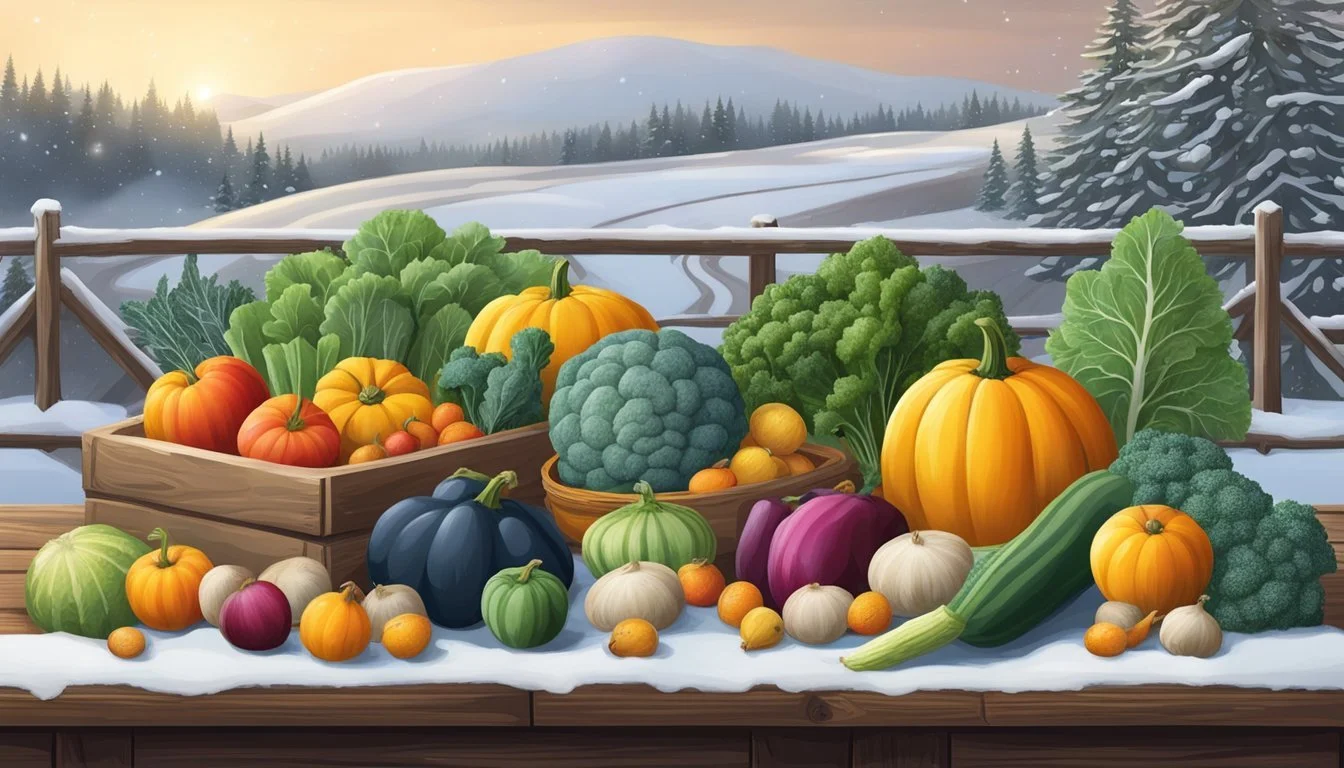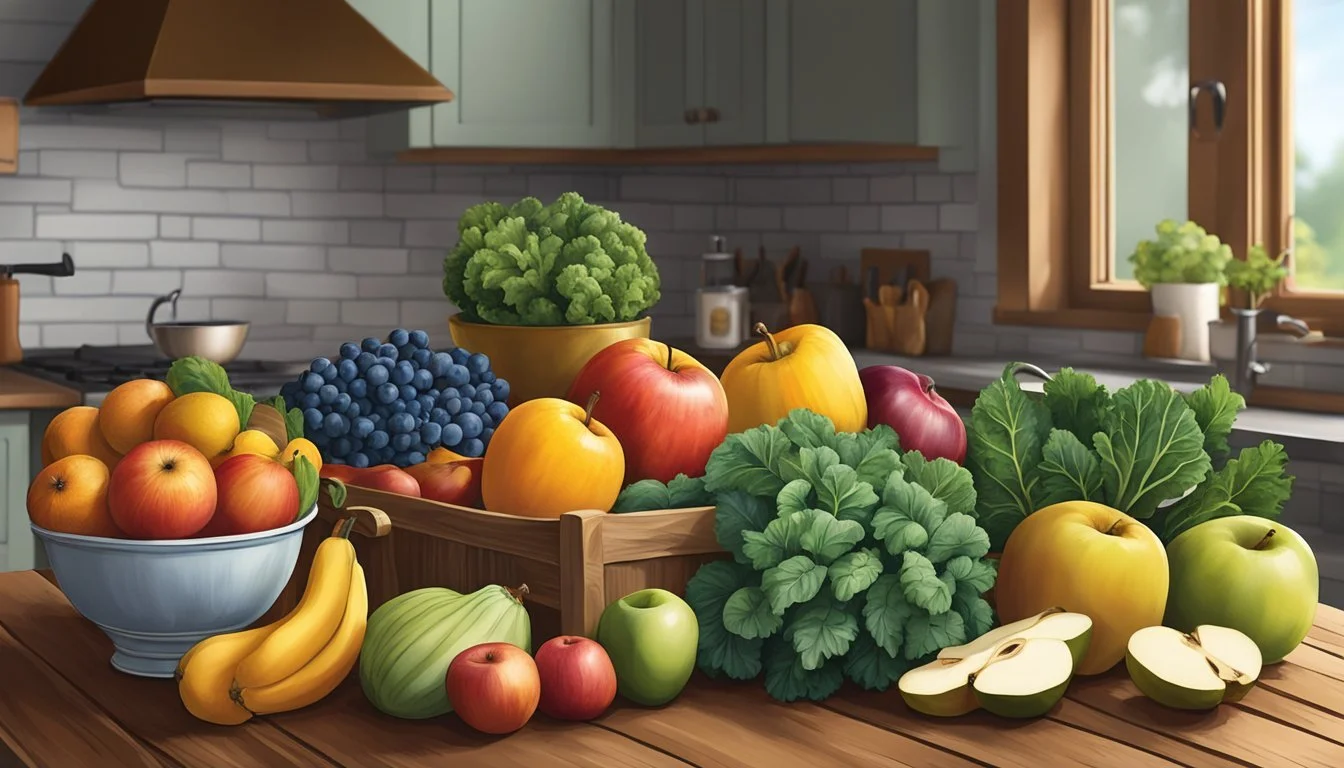New Hampshire Seasonal Fruit & Vegetables in December
A Guide to Winter Produce
This Article is Part of our New Hampshire Seasonal Fruit & Veg Calendar
In the midst of winter, New Hampshire's landscape rests under a blanket of snow, yet even as temperatures drop, local farms and markets offer a bounty of seasonal fruits and vegetables. December brings a unique harvest that characterizes the New England region's resilience and adaptability in agriculture. Root vegetables and hearty greens, which thrive in the cooler climate, dominate the produce selection, providing essential nutrients and a variety of flavors for winter cuisine.
Seasonal eating in New Hampshire during December focuses on utilizing storage crops and those that can withstand the frost. Locally grown produce such as potatoes, carrots (how long do carrots last?), onions, and winter squashes are readily available, having been harvested in late fall and kept in optimal storage conditions. In addition to root crops, December also sees the tail end of the apple harvest, with late-season varieties offering a crisp and fresh option for those seeking fruit during this time.
Within the vegetable realm, leafy greens like kale (What wine goes well with kale?) and collards remain staples, their flavors even enhanced by a touch of frost. These vegetables, along with greenhouse-grown herbs and microgreens, inject freshness into the winter table. Farmers in New Hampshire work diligently to extend the availability of their crops, utilizing greenhouses and other season-extension techniques to provide fresh produce beyond the typical growing season.
Seasonal Overview
In December, New Hampshire transitions deep into winter, bringing distinct seasonal changes that shape its agricultural output.
Understanding New Hampshire's Winter Climate
New Hampshire winters are characterized by cold temperatures and a shortened daylight period, which significantly affects the type of crops that can survive and thrive. Early winter might offer a more lenient climate for certain late-harvest crops, but as the season progresses, the growing conditions become more challenging.
Harvest Cycles and Seasonality
Even with the advent of winter, New Hampshire farmers employ techniques such as hoop houses to extend the growing seasons of certain vegetables and fruits. During this time, root vegetables and sturdy leafy greens that can withstand the colder temperatures are commonly harvested.
Early Winter Harvest Availability Root Vegetables Available Hardy Greens Limited season Apples Late harvest available Winter Squash Stored produce
As the season progresses, the focus shifts to stored and preserved foods, including winter squashes and apples from the late autumn harvest, while fresh greens are often limited to those that can endure the cold, such as kale.
Winter Vegetables
December in New Hampshire marks a time when certain vegetables thrive despite the cold climate. These hearty varieties are well-suited to withstand the frosty conditions.
Hardy Greens and Brassicas
In New Hampshire winters, kale, spinach, and brussels sprouts (how long do brussels sprouts last?) maintain their quality in the chill. They offer not only robust flavors but are also rich in nutrients. Broccoli and cauliflower stand out as well, resilient in the colder temperatures.
Kale: This sturdy green is packed with vitamins and can be grown and harvested throughout winter.
Brussels Sprouts: They improve in flavor after a frost, making them a winter favorite.
Starchy Roots and Tubers
Root vegetables like carrots, potatoes, and beets are staples during the winter months. They store well and can be used in a variety of hearty dishes. Parsnips, radishes, and turnips also make for versatile ingredients and are often available throughout December.
Carrots: Known for their sweetness, which concentrates with cool weather.
Potatoes: A versatile tuber, essential for many winter recipes.
Nutritious Alliums and Stem Vegetables
The allium family, including leeks and fennel (how long does fennel last?), thrives in the cold, contributing depth and flavor to winter meals. Celery also withstands the cold well, perfect for soups and stews.
Leeks: With a mild, onion-like taste, they are ideal for enhancing winter dishes.
Fennel: Offers a unique, anise-like flavor to a variety of culinary uses.
Winter Fruits
In the winter months, the variety of fruits available in New Hampshire shifts to those that store well from the autumn harvest and to citrus fruits, which reach peak season elsewhere but are enjoyed locally.
Local and Stored Fruits
New Hampshire's winters are characterized by the availability of fruits that keep well through the colder months. Apples and pears, harvested in the fall, are commonly stored and remain a staple in the diet of local residents throughout December. They maintain their texture and flavor, making them ideal for a range of uses from fresh eating to baking.
Apples: Various varieties are available, offering a range from tart to sweet.
Pears: Enjoyed for their soft, buttery texture, perfect for both fresh and cooked applications.
Cranberries, while not a tree fruit, are another local fruit to consider. They are harvested in the fall and often sold fresh into the winter, bringing a tart burst of flavor to holiday dishes.
Citrus Delights
While not native to the Northeast, citrus fruits such as oranges and other citrus varieties make their way to New Hampshire markets in the winter. These fruits, sourced from warmer climates, provide a fresh, tangy contrast to the more subdued flavors of the local produce.
Oranges: Rich in vitamin C, they come in many varieties, including navel and Valencia.
Citrus Fruits: Include grapefruit, lemons, and limes, which are also available, adding brightness to winter dishes.
The selection of citrus fruits peaks during winter, giving consumers a taste of sunshine amid the snow-covered landscapes of New Hampshire.
Preparation and Storage Tips
When it comes to enjoying New Hampshire's seasonal produce in December, the key to satisfaction lies in proper storage and cooking techniques. This ensures not only freshness but also that the flavor of each fruit and vegetable is maximized.
Storing for Freshness and Flavor
Fresh vegetables like carrots, onions, and winter squashes can last well through the cold months when stored properly. These should be kept in a cool, dark place, preferably a root cellar for the maximum shelf-life. Humidity levels need to be monitored to prevent softening or spoilage. For instance, onions should be stored away from other produce to retain their crispness and flavor. Potatoes also keep best in cool, dark environments and should be kept away from onions to prevent them from sprouting.
Leafy greens such as kale and spinach need to be refrigerated in airtight containers with a paper towel to absorb excess moisture.
Squashes can be stored in a single layer with ample spacing between them to ensure good air circulation.
Root vegetables should be placed in breathable containers like mesh bags and kept away from ethylene-producing fruits such as apples.
Cooking Methods for Winter Produce
Cooking techniques must be chosen to both enhance flavors and retain the nutritional quality of winter produce. For example, root vegetables such as turnips and carrots are often roasted to concentrate their flavors. This method also preserves the vegetables' nutrients well compared to boiling.
Leafy greens: These can be sautéed with a touch of olive oil and garlic to remain both nutritious and delicious.
Squashes: They are versatile, lending themselves to being roasted for a natural sweetness or mashed for a comforting side dish.
Cabbages: Great for slow-cooking methods, these can be braised or added to hearty stews.
By respecting the integrity of seasonal produce with the correct storage and cooking methods, one can enjoy the true essence of New Hampshire's winter bounty.
Local Markets and Agricultural Practices
In December, the agricultural landscape of New Hampshire shifts to accommodate the colder climate, leveraging local markets and innovative agricultural practices to maintain productivity. These efforts ensure that despite the chill, fresh produce remains available to consumers.
Finding Local Produce
During the winter months, one might assume that local produce would be scarce. However, New Hampshire's markets remain vibrant with the help of greenhouses and cold storage of earlier harvests. Consumers can locate local produce such as winter squash and root vegetables at farmers' markets, which adapt by moving indoors or setting up temporary structures to shield from the cold.
Winter Farmers' Markets: Provide seasonal and stored produce
Farm Stands: Often supplied by greenhouse-grown crops
Sustainable Farming in Cold Months
Agriculturalists combat the harsh New England winters through embracing sustainable farming practices. They employ greenhouses which allow for an extension of the growing season and utilize cold-tolerant crops, which can thrive despite the frost. Attention to pest management remains crucial, as enclosed environments can lead to increased pest presence without careful oversight.
Greenhouse Agriculture: Extends growing seasons for herbs and leafy greens
Crop Selection: Focus on cold-hardy varieties that can withstand or grow in lower temperatures
Integrated Pest Management (IPM): Keeps pest populations under control with minimal ecological impact
Health Benefits
Eating seasonal produce from New Hampshire in December offers specific health advantages such as high nutritional value and support for the immune system during the colder months.
Nutritional Value of Seasonal Produce
Seasonal fruits and vegetables harvested in December in New Hampshire are packed with essential vitamins and minerals. For instance, Comice pears, available during this month, are particularly nutritious. They provide vitamin C, important for skin health, and fiber, which aids digestion.
Nutrient Benefit Vitamin C Supports skin health and collagen formation Fiber Enhances digestive health
Boosting Immunity During Winter
The consumption of seasonal produce like winter squash can play a role in boosting the immune system during winter. These vegetables are often rich in beta-carotene and antioxidants, which are vital for maintaining a strong immune system to fight off infections.
Nutrient Immune Function Beta-carotene Converts to vitamin A, crucial for immune health Antioxidants Protect cells from oxidative stress
New Hampshire's seasonal produce in December is not only delicious but also contributes to optimal health by providing essential nutrients that cater to specific seasonal needs.







